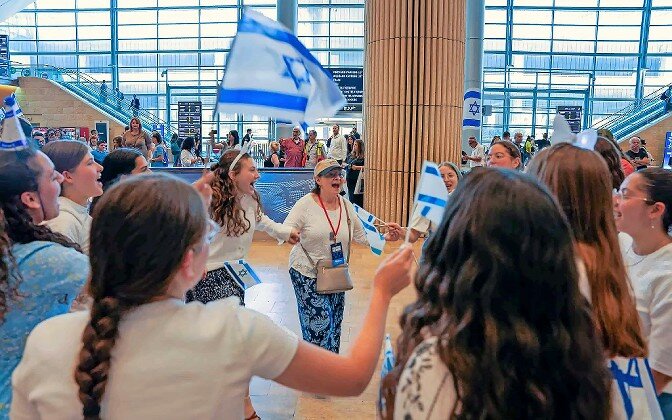Jews caught between Zionism and antisemitism
“There’s no denying the uptick in antisemitism,” stated Edna Weinstock-Gabay, CEO of Keren Hayesod. Since the onset of the Gaza war, Jews in the United States and Canada have witnessed a surge in antisemitic incidents, particularly on college campuses.
An Orthodox Jew in New York described his new reality: “Before I step out of my apartment, I have to weigh whether to wear a kippah or a hat, whether to display my hostage pin or conceal it under my shirt.”
Although Jews in Canada “still enjoy a good quality of life, we can’t ignore the extreme incidents that have erupted since Oct. 7,” said Sarah Mali, CEO of the Jewish Federations of Canada-UIA. “There’s a palpable increase in feelings of insecurity. I know of individuals who now lower their blinds when lighting Shabbat candles.”
Shira Ruderman, CEO of the Ruderman Family Foundation, brings a personal perspective to campus turmoil. With her daughter studying at Columbia University and her son at Northeastern University in Boston, it’s become a personal concern.
“It feels like the entire ideological and value system we believed in is crumbling,” she reflected. “We thought we had it all figured out, that being Jewish in America was a non-issue. We saw ourselves as global citizens, fully integrated. Then suddenly, it’s as if someone held up a mirror, forcing us to confront a harsh reality.”
“In some areas, there’s genuine fear,” she continued, with students forming “protection squads” to accompany each other.
Yet, in the face of these challenges — or perhaps because of them — Jewish communities across North America are demonstrating remarkable resilience. Becky Caspi, CEO of the Jewish Federations of North America in Israel, reports a surge in interest from previously unaffiliated Jews seeking to connect with their communities.
“Since Oct. 7, we’ve seen a strong desire among Jews to belong, to actively participate in Jewish life,” she said. “We’re witnessing a groundswell of interest in Jewish communal life.”
There are approximately 500 Jewish communities spread across the United States and Canada. Of these, 146 are organized as federations (the majority in the United States), while the remainder are smaller communities without extensive professional infrastructure.
“Our challenge now is finding meaningful ways to welcome and integrate these individuals into our communities,” Caspi noted. “Our data shows that about a third of Jews are eager to deepen their understanding of Israel and Jewish life. Approximately a quarter express interest in becoming more involved in their local Jewish community activities.”
A young Jewish resident of Texas encapsulates this shift: “As a secular Jew, I’ve found myself more inclined to observe holidays and openly discuss my Jewish identity since Oct. 7.”
While acknowledging the gravity of rising antisemitism, Caspi advocates for a measured perspective.
“This antisemitism demands our attention and a well-crafted response. But let’s be clear — this is not pre-Holocaust Germany,” she said. “Our government institutions, law enforcement and judicial systems stand firmly in support of the Jewish community. We are not alone in this fight.”
Amid current challenges, North American Jewry has demonstrated an unprecedented level of support for Israel since Oct. 7. This mobilization has taken various forms: financial contributions, volunteer efforts and public displays of solidarity. A prime example was the massive march in Washington last November, which drew as estimated 300,000 participants.
“Toronto witnessed a similar outpouring of support, with tens of thousands of Jews marching in solidarity,” Mali recounted. “In other cities, smaller groups have taken to the streets, proudly waving Israeli flags. I was particularly moved by a seven-year-old boy from Victoria Island who lives with disabilities. He wrote me a letter, asking that his modest contribution be used to buy shoes for evacuees. These gestures speak volumes about our community’s spirit.”
The financial support from Jewish communities has been nothing short of extraordinary. This includes substantial donations from wealthy individuals as well as grassroots efforts collecting contributions dollar by dollar. To date, an impressive $852 million has been raised. “And we’re not done yet,” said Caspi.
“Jewish communities have contributed over a billion dollars to Israel,” Shira Ruderman stated emphatically. “This level of mobilization is unprecedented.” Becky Caspi added, “These staggering figures underscore North American Jewry’s unwavering commitment to Israel in times of crisis.”
Sarah Mali struck a note of cautious optimism: “While we’re navigating a complex situation, I remain hopeful. This past year has shown that the Canadian Jewish community can stand firm in the face of adversity. Yes, we face threats, but we’ve also strengthened our resolve. Our community now proudly proclaims: We are strong and proud Jews.”
Shira Ruderman offered a concluding perspective on the state of American Jewry: “The Jewish community in America is robust, with Israeli-Americans playing a particularly vital role. There are approximately 850,000 Israelis living here, and they all share a common surname — Zionism. They wear their Israeliness and Judaism as badges of honor, without shame or compromise.”






